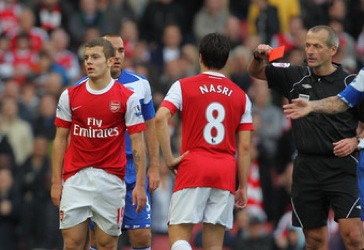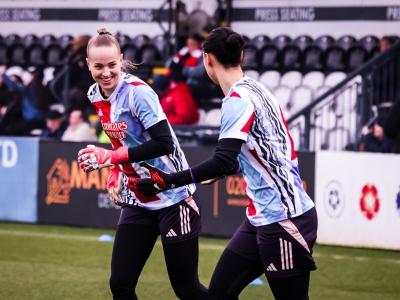Of all the immediate reaction to Jack Wilshere's dismissal over the weekend, one headline on Newsnow caught my attention, courtesy of Goodplaya. "He is that kind of player". It is true that Jack Wilshire has been guilty of some “near misses” during the course of this season – on Saturday, the law of averages caught up with him.
I believe that Jack Wilshere will be an exceptional talent. Privately, the assorted hacks dissecting the game might have encountered confusion. An English Arsenal player (some will lose themselves at this point) commits a reckless / negligent tackle. Given that he may become as central to English hopes as Rooney or Gerrard, do they pillory him or try to write it off as the impudence of youth?
I am afraid that the English media are often guilty of, at least, pumped up Jingoism before judging the intent of a player. There were no such concerns regarding Nigel De Jong - although it was a sickeningly crude lunge on Ben Arfa. There have been others and any number which through luck alone did not amount to “reducers”. Recently, the persistence of regular writers such as Arseblog and the proliferation of broken legs have resulted in a more balanced focus on the issue. Regrettably, the increase in awareness has not yet reduced the likelihood of repetition.
More by luck than judgement, Zigic did not suffer as Eduardo did at St. Andrews. Whilst it was easy to understand the reverberating chants of Eduardo's name (which will be repeated less ironically on Tuesday); as Zigic lay prostrate, the lunge was entirely unacceptable.
In law, players accept an inherent risk when they cross the white line. Equally, each player - and manager - must take responsibility for taking reasonable care in their conduct. Above those observations has to be the recognition that sport has quite literally become a law unto itself.
I sympathise with the argument suggesting that the perpetrator of a serious injury should be banned until their victim recovers. It won't happen - football is struggling to embrace proven technology - so what hope? That said, perhaps now is the time to address the issue of intent, without accusations of hysterical self-righteousness.
Clearly, a two footed / lunging challenge abdicates any measure of control upon launching. I do not accept that it is the preserve of the "honest English game", nor what makes football in this country more passionate than elsewhere. Moreover, judging by the performance of the England team in South Africa, neither does it augur success. At best, the player in possession may be dispossessed. The player making the challenge cannot go forward - the ball becomes "loose". Perhaps in a one on one, facing a goal scoring opportunity, the defending player can argue that the desired effect is achieved.
Consider then Wilshere's offence - and those of De Jong, Smith, Taylor and Shawcross (among others). All these incidents occurred in the middle of the pitch. Control of the ball was lost, in an area where no immediate threat could reasonably be perceived.
So, you retort, is it okay to threaten a player's career if he is clean through on goal? No, I say, under any circumstance. In my opinion, this is the crux of the matter. Yes, the game has become ever faster and yes, bad challenges are not a new phenomenon - watch any video featuring Don Revie's "family". However, in conjunction, these facts do not excuse a detailed review of the laws of the game; rather, they precipitate the urgency of priority.
UEFA, FIFA and the FA are universally spineless in dealing with the ills of the game. Racism, financial irregularities and serious foul play are as globally rife as ever they were. It is a little ironic that this latest episode occurred during the Club's commendable "Arsenal for Everyone" day. We are reminded that we too are not above criticism.
So, what do I suggest? Any preemptive action has to be applied across the board and consistently. That is solely the responsibility of the governing bodies and arguably the biggest challenge facing the game today. Retrospective action should be taken to redress referees' contemporaneous incompetence. Furthermore, referees' ability to not "lose" games early on and to punish bad challenges before intensity escalates uncontrollably is vital.
Ultimately, for the good of the game, there has to be a deterrent. If a professional is seriously injured, there are requisite facilities and infrastructure to enable them to cope. What about the Sunday league player? Is it not inevitable that bad behaviour will be condoned, if not copied on school pitches?
Supposing Jack Wilshere now faced a TEN game ban. Fair enough? Well perhaps, if De Jong was suspended for TWENTY. Otherwise, I suspect that we may have to wait until one of the English media’s heroes is seriously injured before sanity is restored. How many more serious injuries may occur until the issue is – forgive the pun – tackled head on. If we agree that sport is a law unto itself, then surely we must adopt a unique approach?
Here it is; let the punishment fit the crime - another legal cornerstone. The tackle from behind has, quite rightly, been outlawed. How many challenges made a foot off the ground, studs up, end with the tackling player in control of the ball? Exactly: none. I suggest a five game ban upon attempt; ten upon defined contact and twenty upon serious injury. These should also be applied to elbowing. If you can't differentiate between a genuinely controlled sliding tackle and the increasing trend of legitimised assaults, then presumably you have never been on the receiving end of a crass challenge. Count yourself fortunate.
I understand the counter arguments – in law, there is the presumption of innocence until guilt is proven. How can intent be proven? Make no mistake; the notion of intent is a red herring. If a killing is proven to be "merely" manslaughter; somebody has still died unlawfully. Mens rea is a fundamental in law, yet actions taken are not always fuelled by adrenaline and the heat of battle – though these motives are not excusable for serious negligence or recklessness. Quite simply, if you don’t want to risk the punishment, don’t risk the tackle. That still allows plenty of room for a “contact sport” – just one in which technique becomes more important. Following through; or going over the top then have consequences not just for the recipient of the challenge, but rightly, the offender.
If you have put in a reckless challenge, you may have served a three game ban, at worst and a fine. Think: how appealing is the thought of a twenty game ban (not to mention increased likelihood of possible legal action). Still fancy it?







